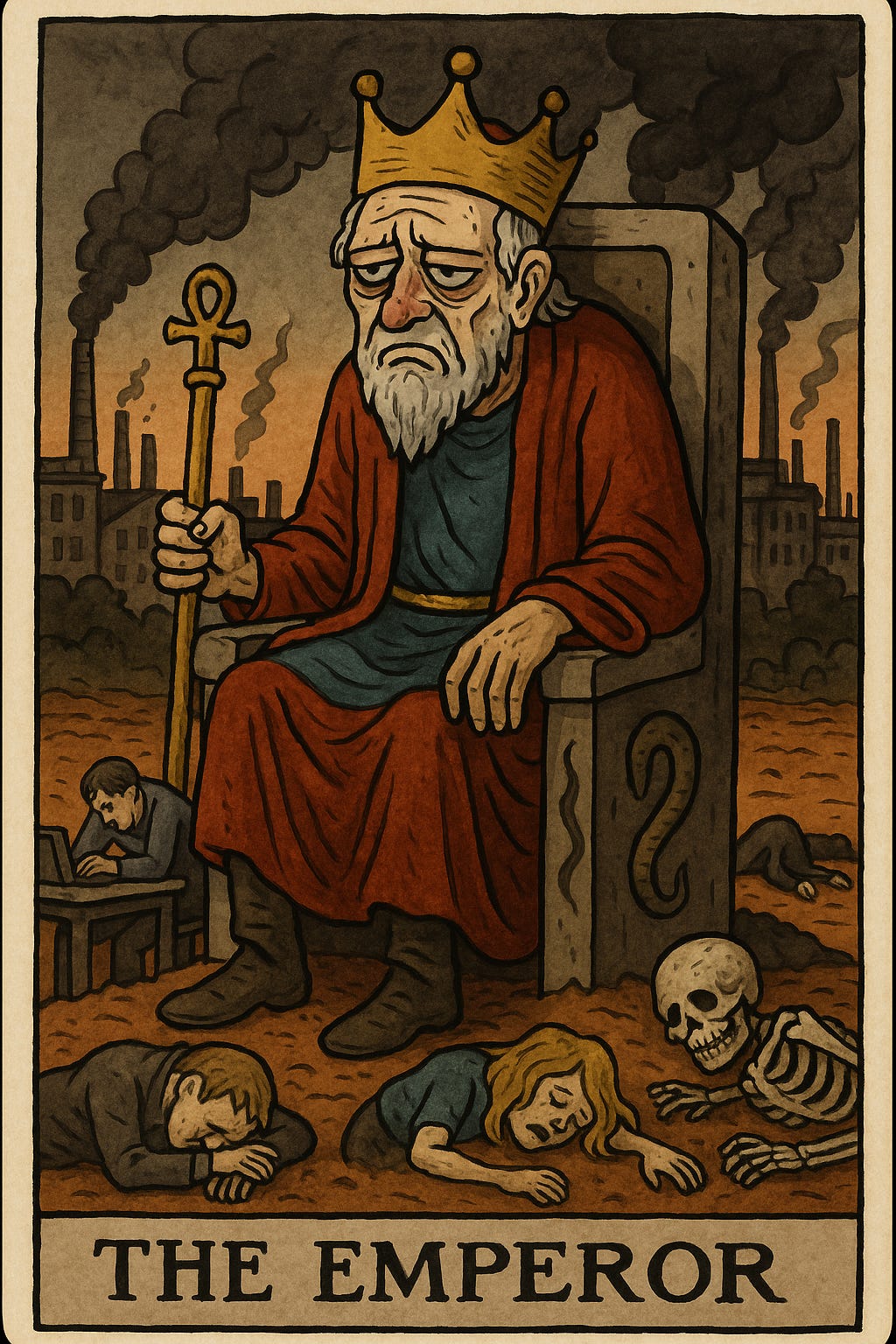The Emperor Has No Chill: How Corporate America Lost Its Humanity
Our toxic work culture isn’t a glitch in the system—it is the system. And it’s grinding an entire generation into dust.
IN THE CORPORATE halls of America, the emperors in corner offices are running a toxic empire—and their workers are the ones getting burned. From tech startups to creative agencies to Wall Street firms, a culture of relentless work and “hustle” has taken root.
Burnout has become so normal that there’s a reason everyone you know is exhausted. Not tired, not “in need of a long weekend,” but existentially cooked. The kind of tired that seeps into your bones and makes you stare blankly at your screen, wondering how this became normal.
Somewhere between the Zoom fatigue, the endless Slack pings, and the quarterly “all-hands” where leadership pretends things are fine, we stopped noticing how absurd it’s all gotten.
The American workplace has become a machine that eats people and spits out PowerPoints. We call it “corporate culture.”
And if you’re a Gen X manager—one of the unlucky few still holding middle ground between Boomers who refuse to retire and Gen Z who have the good sense to log off at 5—you’re living proof that this system doesn’t work.
You are the Emperor’s court: loyal, overextended, and quietly burning out in service of an unwise ruler who long ago mistook domination for leadership.
In late-stage capitalism, work isn’t just what we do; it’s who we are. That’s the con. We’ve been sold this myth that grinding ourselves down is noble, that hustle equals virtue, that burnout is simply “a phase.”
How many people do you know who have burned out at work?
How many do you know who have burned out more than once? I know dozens, some of whom had to flee their corporate lives to save their physical ones—and their sanity.
The pandemic cracked that illusion for a moment. We saw a glimpse of another way to live—remote work, flexibility, balance—and then the Emperors panicked. Suddenly, productivity trackers were installed, badge swipes were monitored, and “return-to-office” mandates rolled out like royal decrees. Because control is addictive, and nothing scares an insecure ruler like workers discovering autonomy.
We were forced back into offices and never-ending commutes. The promise of a “free” coffee was the reward, and the grim realization that to save the commercial real estate valuations of every downtown core, all we had to do was throw ourselves on the flaming pyre of capitalism.
Yet the numbers don’t lie: more than two-thirds of Americans now report burnout symptoms, and engagement is at a decade-long low. People aren’t lazy; they’re done. Done pretending endless meetings and performative busy-ness are signs of value.
For Gen X, this is a special kind of hell. We grew up with dial-up internet and the “greed is good” gospel. We believed if you worked hard enough, played the game long enough, you’d earn security. Now, if we’re lucky, we’re managers in a world where security is a mirage.
Middle management used to mean stability; now it’s an emotional meat grinder. You’re expected to shield your team from layoffs, deliver impossible metrics to senior leadership, learn three new AI tools by Tuesday, and smile while doing it. Studies show middle managers are the most burnt-out cohort in corporate America. Nearly half are actively considering quitting.
And who can blame them? After twenty-plus years of “leaning in,” they’ve discovered the system isn’t broken—it’s working exactly as designed: extract maximum productivity for minimum cost. The Emperor doesn’t care if you collapse. There’s always another worker—or algorithm—waiting in the wings.
Hustle culture was once framed as empowerment. Work harder! Dream bigger! Sleep when you’re dead! But here’s the secret: hustle culture was never about your dreams. It was about theirs. The more you identify with your output, the easier it is for them to exploit it.
The irony is, this obsession with productivity is making us less productive. Stress and exhaustion destroy creativity, collaboration, and innovation.
When you’re constantly in survival mode, there’s no space left for curiosity or joy.
When was the last time you felt JOY at work?
Yet the Emperor keeps shouting for more—more output, more growth, more sacrifice. The empire must expand, even as its citizens crumble.
The Great Awakening?
But here’s where the story turns. The peasants are revolting (insert joke), but not with pitchforks—with resignation letters, boundaries, and out-of-office replies.
The Great Resignation wasn’t just people quitting jobs. It was people reclaiming power. Millions walked away from underpaid, overworked roles and said, “I want my life back.” Many found it. Others built new careers on their own terms.
And for those who stayed, quiet quitting became the middle finger behind the corporate curtain. Doing your job and nothing more isn’t laziness—it’s survival. It’s a refusal to keep giving unpaid labor to companies that see you as completely expendable.
Even Gen Z, fresh to the workforce, arrived with a radical idea: they expect to be treated like humans. They talk about mental health, demand flexibility, and leave jobs that don’t align with their values. Older generations scoff, but secretly, many of us envy them.
They’re simply refusing the lie we swallowed whole.
The Emperor’s New Clothes
Late-stage capitalism loves to rebrand exploitation as innovation. A 4-day workweek trial shows stunning success? Leadership calls it “interesting,” then doubles your workload. Workers organize a union? Companies host “listening sessions” while quietly hiring consultants to crush the effort.
We are ruled by Emperors who believe empathy is a threat and exhaustion a virtue. Their kingdoms are glass towers filled with buzzwords: synergy, optimization, transformation. The courtiers nod along, too afraid to say what everyone knows—the Emperor is naked, and his empire is on fire.
Meanwhile, workers like you and me are out here trying to survive the fallout: stress-induced illness, mental health crises, and collapsing family lives. Doctors now prescribe antidepressants not for “chemical imbalance” but for living in a society that refuses balance altogether.
Beyond the Burnout
Still, hope flickers. Across industries, people are starting to whisper the unthinkable: what if we built something better?
Some companies are experimenting with real change—shorter workweeks, flexible schedules, mandatory disconnection hours. They’re discovering that when people aren’t terrified or half-dead, they actually perform better. Shocking, I know.
Others are beginning to see the financial case for compassion: every dollar spent on mental health support yields four in productivity and retention. Turns out, humanity scales.
But lasting change won’t come from the top down. It never has. It’ll come from us—the burnt-out middle, the exhausted frontlines, the people tired of dying for profit margins. It starts with small rebellions: saying no, logging off, taking your damn vacation. Talking openly about burnout without shame. Reminding your team—and yourself—that boundaries aren’t betrayal.
Redefining Success
If this era has a lesson, it’s that success built on suffering isn’t success at all. The richest man in the world can buy a platform, rebrand it, and destroy it in a year—and still be praised as a visionary. Meanwhile, the workers who kept it running are called entitled for wanting fair pay.
We have to redefine what winning looks like. Maybe it’s not a title or a bonus, but being present for your kids, your friends, your life. Maybe it’s finishing the workday with enough energy left to create something, anything, that belongs to you.
The Emperor will call that weakness. But we know better.
We know that power without wisdom is decay, and empires built on burnout eventually fall.
The Journey Ahead
The place we’re at now is filled with end-stage capitalistic hubris: rigidity, control, and arrogance—the downfalls of rulers who refuse to learn. That’s where we are now: a civilization mistaking domination for strength, blind to its own fragility.
But buried in the ashes of this burnout is a seed of renewal. Something better is waiting to be planted if we dare to dig up what’s rotted. Our path forward may be fraught, but it is the long, necessary journey away from chaos toward something calmer, wiser, freer.
That’s where we stand now—mid-crossing. The storm is still raging, but the shore is out there. We just have to keep rowing.
A Call to Wake Up
So, to the Emperors of industry and the exhausted subjects propping them up: the illusion is cracking. The old order is collapsing under the weight of its own greed. You can keep pretending everything’s fine—or you can start building something humane.
Because this isn’t just about burnout. It’s about who we want to be as a society. Do we value profit over people? Growth over grace? Or can we finally admit that the way we work is killing us—and that life is worth more than a quarterly report?
The answer starts small. A single “no.” A collective boundary. A willingness to imagine a world where work serves life, not the other way around.
Late-stage capitalism may have taught us to equate exhaustion with success, but I’m betting on something different. I’m betting on the slow, stubborn power of people who refuse to give up their humanity.
Because once you see the Emperor for what he is—tired, unwise, presiding over a toxic kingdom—you can’t unsee it. And when enough of us stop bowing, the empire ends.
That’s not a tragedy. It’s a beginning.
Lawrence Winnerman writes at the crossroads of culture, politics, and innovation—chronicling how we live, create, and fight for meaning in an age of upheaval. Support his independent work at Ko-fi.com/LawrenceWinnerman.
Or buy my latest tee design!





So good. I felt this in my weary Gen X bones.
What about the Gen Xers working in the trades and factories? Same burnout? I ask this because I feel like these workers are often overlooked in generational assessments.